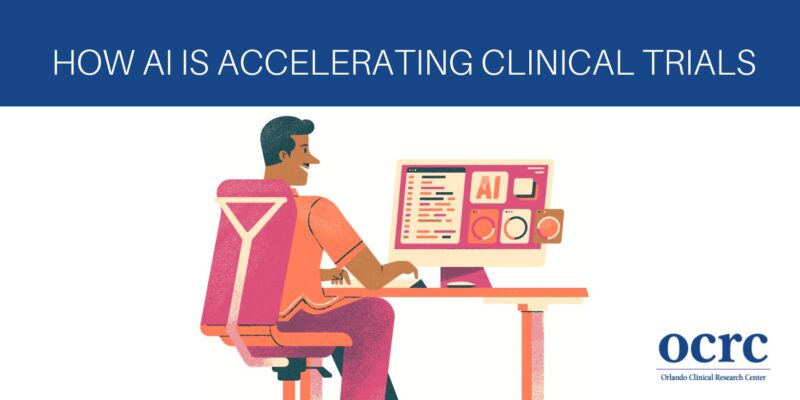
Clinical trials play a vital role in helping medical researchers develop new treatments, generate insights that deepen our understanding of diseases, and advance patient care. However, these studies can be resource-intensive and time-consuming, particularly due to challenges with volunteer recruitment and staffing demands.
Advancements in artificial intelligence (AI) have introduced innovative ways to better manage clinical trials. AI allows for the automation of time-consuming tasks and helps streamline research processes so that scientists can focus on advancing medical knowledge.
Learn more about AI and how it’s transforming clinical trials.
Artificial intelligence is the ability of a computer to perform complex tasks that would be typically reserved for humans. An AI system relies on huge amounts of data that it uses to train and improve, changing the way it responds to queries as it learns.
AI is versatile, which means that scientists can use this technology in all manner of settings. From automating repetitive tasks to choosing the right candidates for clinical trials, AI technology can improve efficiency and accuracy in medical research.
Innovations in artificial intelligence offer numerous benefits for clinical trials, helping to speed up processes so that pharmaceutical companies and researchers can streamline operations and accelerate timelines.
One of the biggest challenges that clinical researchers face is finding the right participants for a trial. Usually, researchers must look for people who meet very specific requirements. This can mean sifting through hundreds or thousands of applications.
AI-powered tools help identify potential candidates by analyzing electronic health records and a variety of other data sources. These tools can make the recruitment process even easier by finding the most appropriate site for the clinical trial. They can gather data on demographics, infrastructure, and recruitment potential to suggest trial sites.
Not all clinical trials are as effective as others, and sometimes the way the study is designed is the problem. Scientists can use AI to more easily analyze historical data from previous clinical trials as well as from real-world scenarios to improve protocols and identify which designs will deliver the most effective and accurate results.
Data input is often a challenge with clinical trials because of the amount of information that needs to be gathered. There is also the risk of manual errors.
AI streamlines the entire data management process, automating some of the most time-consuming aspects. This not only helps prevent human errors but also allows researchers to more easily find anomalies in the data that could impact results.
Many AI-powered tools can analyze data from a variety of sources, including electronic medical records and imaging studies. Having a fast and accurate way of accessing vast amounts of information helps researchers predict treatment responses, identify biomarkers, and even assess how effective a drug is.
Adverse effects are always a concern in clinical trials. AI-powered tools can help predict potential events, allowing the researchers to make changes to improve the safety of the participants.
AI can also provide targeted information and support to participants. These tools can identify potential challenges and suggest solutions that may improve treatment adherence and trial participation.
One factor that could put a wrench in any clinical trial is the financial resources it will require. Since AI can improve data input and analysis, as well as speed up the recruitment process, it can lower the overall costs of the project.
Additionally, since AI reduces errors, it may prevent the kinds of mistakes that invalidate entire blocks of data.
Clinical trials are critically important for medical advancement. With the help of AI, clinical researchers can more easily find the most appropriate candidates and more efficiently manage large amounts of complex data. This leads to faster results, less expensive clinical trials, and an overall improvement in outcomes.
At Orlando Clinical Research Center, we use state-of-the-art AI tools to perform Phase I through Phase IV clinical trials in Orlando, Florida. Whether you’re looking to participate in current studies or are searching for the most appropriate venue for conducting your own trial, our team is here to answer your questions and provide guidance. Contact us today to learn more.
